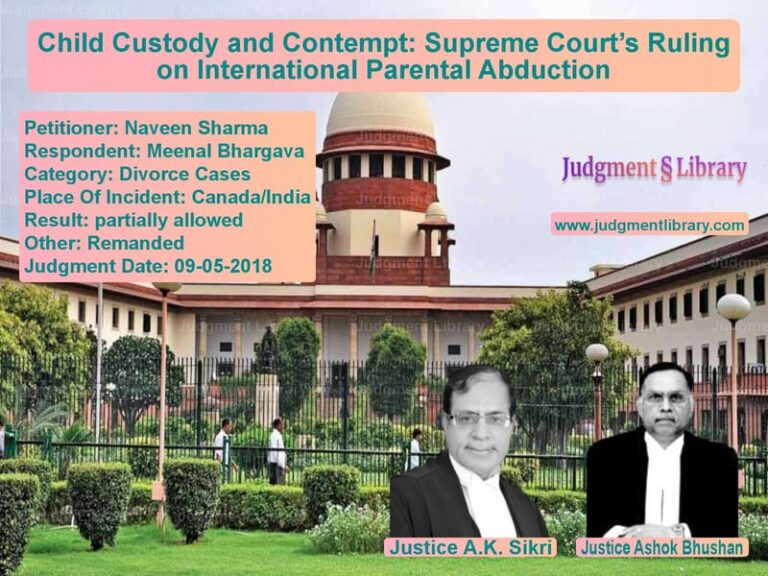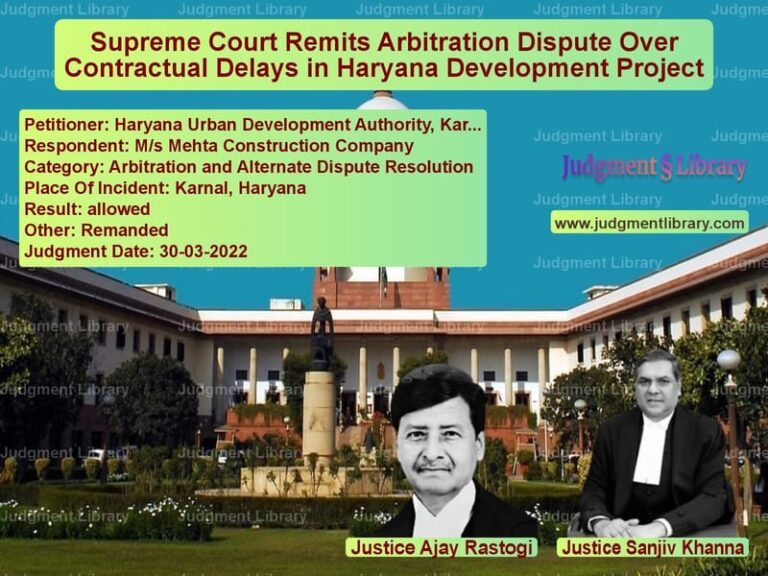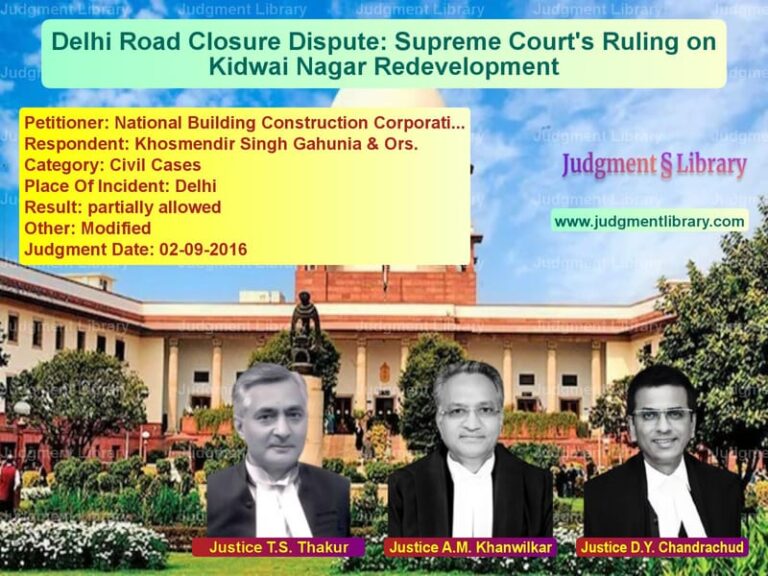Partition Dispute and Voidability of Minor’s Consent: Supreme Court’s Verdict in M. Arumugam v. Ammaniammai
The case of M. Arumugam v. Ammaniammai & Ors. is a significant legal dispute concerning the rights of minor heirs in a Hindu Undivided Family (HUF) property and the validity of a release deed executed on behalf of a minor. The Supreme Court delivered its judgment on January 8, 2020, addressing whether a minor’s share in a joint family property could be relinquished by a natural guardian without court sanction and the legal consequences of such an act.
The ruling highlights key aspects of Hindu law regarding coparcenary rights, the role of natural guardians, and the applicability of limitation laws to challenge property transactions undertaken during minority.
Background of the Case
The dispute originated in a Hindu joint family consisting of Moola Gounder and his two sons, Palanisamy (Defendant No. 1) and Arumugam (Defendant No. 2). Moola Gounder passed away intestate on December 28, 1971, without leaving a will. At the time of his death, the family owned a joint property, which, under Hindu law, was to be divided equally among the surviving coparceners.
Following his demise, the family’s estate was to be divided into three equal parts—one share each for the two sons and one share for Moola Gounder’s heirs, including his widow, three daughters, and two sons.
However, a registered release deed was executed in favor of the two sons, relinquishing the rights of the widow and daughters, including the plaintiff, who was a minor at the time. The mother, acting as the natural guardian, signed the deed on behalf of the plaintiff, while Defendant No. 1 acted as the guardian of Defendant No. 2, who was also a minor.
Upon reaching adulthood, the plaintiff filed a suit in 1989, challenging the release deed and seeking partition of the property.
Arguments by the Petitioner (M. Arumugam)
- The petitioner argued that the release deed was legally binding as the mother, being the natural guardian, had the right to act on behalf of the minor.
- The High Court erred in declaring the release deed void ab initio, as it was, at best, a voidable document that should have been challenged within three years of the plaintiff attaining majority.
- The partition deed executed later between the two brothers was legally valid, and the plaintiff had no claim over the property.
Arguments by the Respondent (Ammaniammai & Ors.)
- The mother, as the natural guardian, could not relinquish the minor’s share in the HUF property without prior court approval, rendering the release deed void.
- The suit for partition was legally maintainable since the property remained joint family property despite the purported release deed.
- The partition deed executed between the brothers was irrelevant to the plaintiff’s right to claim a share in the property.
Supreme Court’s Judgment
The Supreme Court ruled in favor of the petitioner, setting aside the judgment of the High Court and restoring the trial court’s verdict. The key findings were:
- The interest of a Hindu coparcener in a joint family property is governed by Section 6 of the Hindu Succession Act.
- The mother, as a natural guardian, had no authority to alienate the minor’s share without obtaining permission from the court under Section 8 of the Hindu Minority and Guardianship Act.
- However, such a transaction is not void ab initio but voidable at the instance of the minor, and it must be challenged within three years of attaining majority.
- The plaintiff had not challenged the release deed within the limitation period, making the claim legally untenable.
Legal Precedents Cited
- Gurupad Khandappa Magdum v. Hirabai Khandappa Magdum (1978) – Established that notional partition occurs at the time of a coparcener’s death.
- Commissioner of Wealth Tax v. Chander Sen (1986) – Held that property inherited under Section 8 of the Hindu Succession Act is personal property and not joint family property.
- State of Maharashtra v. Narayan Rao (2019) – Clarified that relinquishment of a minor’s interest without court sanction is voidable, not void ab initio.
Impact of the Judgment
The ruling reinforces the legal principle that a minor’s property rights cannot be alienated without court permission, but such transactions are voidable rather than automatically void. It also highlights the importance of timely legal challenges to voidable contracts.
By upholding the validity of the release deed due to the lapse of the limitation period, the Supreme Court emphasized the importance of procedural diligence in property disputes.
The judgment has far-reaching implications for inheritance and property law in India, ensuring that minors’ property rights are protected while preventing delayed claims from disrupting settled property arrangements.
Petitioner Name: M. Arumugam.Respondent Name: Ammaniammai & Ors..Judgment By: Justice Deepak Gupta, Justice S. Abdul Nazeer.Place Of Incident: Tamil Nadu.Judgment Date: 08-01-2020.
Don’t miss out on the full details! Download the complete judgment in PDF format below and gain valuable insights instantly!
Download Judgment: M. Arumugam vs Ammaniammai & Ors. Supreme Court of India Judgment Dated 08-01-2020.pdf
Direct Downlaod Judgment: Direct downlaod this Judgment
See all petitions in Property Disputes
See all petitions in Succession and Wills
See all petitions in Landlord-Tenant Disputes
See all petitions in Contract Disputes
See all petitions in Judgment by Deepak Gupta
See all petitions in Judgment by S. Abdul Nazeer
See all petitions in allowed
See all petitions in supreme court of India judgments January 2020
See all petitions in 2020 judgments
See all posts in Civil Cases Category
See all allowed petitions in Civil Cases Category
See all Dismissed petitions in Civil Cases Category
See all partially allowed petitions in Civil Cases Category







